PR 06/21 | Human decency before profit
The construction industry has hit yet another low today should reports carried in the local press be confirmed regarding an as-yet unnamed contractor having unceremoniously dumped a seriously injured worker on the side of a deserted road.
As we discuss ambitious climate change targets, low carbon strategy, and the New Bauhaus Initiative, this incident is a stark reminder that some industry operators are yet to reach basic levels of responsible behaviour grounded in humanity and compassion.
Until contractors are required to possess a licence to operate, which among other things would ensure that they adhere to construction regulations and provide lawful employment, we will never make the quality leap we require. With a licensing regime finally in place, it would be expected that such a contractor would lose said licence and would be unable to operate again should such allegations be confirmed.
The Kamra tal-Periti is aware that the discussion on draft regulations on the licensing of contractors are scheduled to resume at BICC shortly, after having been on hold since May 2019. The Kamra shall be insisting that the new licensing regulations include provisions sanctioning or barring any contractors who were found to be responsible for serious injury or the loss of life of their workmen or neighbours through negligence prior to their coming into force.
The industry must send a strong signal to “cowboy” operators that all its main stakeholders shall adopt a zero-tolerance policy towards behaviour which is inhumane, exploitative, and negligent to its labour force.

